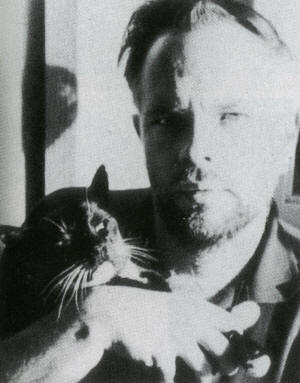 On March 2, 1982 Philip K. Dick died of a heart attack after having two strokes and being placed in the hospital. I was eleven years old and had not heard of Philip K. Dick even though I was reading Science Fiction and Fantasy novels. I saw Blade Runner when it was shown on network TV and a few years later it became my favorite film. It was only in college, eight years after his death, that I read my first PKD novel, Do Androids Dream Of Electric Sheep? for a paper in a Film Noir course. I picked the topic of comparing a Film Noir movie with the novel and Blade Runner was listed. Since I loved the movie I read the novel and he quickly became my favorite writer after loving that book, reading Ubik which was in my dorm’s library and so on. That was just before Vintage began reprinting all of Philip K. Dick’s Science Fiction novels and I purchased every one that came out. I was lucky to discover his work just before what I think of as the First PKD Renaissance in the early 1990’s and was able to purchase many items that are not readily available now.
On March 2, 1982 Philip K. Dick died of a heart attack after having two strokes and being placed in the hospital. I was eleven years old and had not heard of Philip K. Dick even though I was reading Science Fiction and Fantasy novels. I saw Blade Runner when it was shown on network TV and a few years later it became my favorite film. It was only in college, eight years after his death, that I read my first PKD novel, Do Androids Dream Of Electric Sheep? for a paper in a Film Noir course. I picked the topic of comparing a Film Noir movie with the novel and Blade Runner was listed. Since I loved the movie I read the novel and he quickly became my favorite writer after loving that book, reading Ubik which was in my dorm’s library and so on. That was just before Vintage began reprinting all of Philip K. Dick’s Science Fiction novels and I purchased every one that came out. I was lucky to discover his work just before what I think of as the First PKD Renaissance in the early 1990’s and was able to purchase many items that are not readily available now.
If you have some memories of thirty years ago on March 2 and would like to share them, please add a comment below.
Philip K. Dick obituary in the New York Times
(Original Link: Philip K. Dick obituary in the New York Times, The New York Times, March 3, 1982)
DIED. Philip K. Dick, 53, prolific, sometimes visionary science-fiction writer, whose multilayered stories probed the discrepancies between illusion and reality; of a stroke; in Santa Ana, Calif. The characters in his 50 novels (Flow My Tears, the Policeman Said) were often ordinary people trapped in extraordinary circumstances whose distorted perceptions prevented them from realizing their own dilemmas. The task of the science-fiction writer, said Dick, “is creating multiverses, rather than a universe.”
Source: Time Magazine: March 15, 1092, p. 92.
Philip K. Dick, 54, award-winning author of 35 science-fiction novels and six short-story collections; of complications following a stroke, in Santa Ana, Calif., March 2. Dick, whose works are distinguished by deftly crafted, believable characters trapped in an uncertain world, won the 1962 Hugo Award – voted on by American scifi fans – for his novel “The Man in the High Castle.”
Source: Newsweek: March 15, 1982, p. 87.
Other Remembrances:
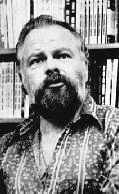 “I was 21 when it happened. There were no mobile phones around. Reagan was your president, Pertini was ours. We still had liras here. You still used typewriters, and so did I. 1982. Looked like a very modern year, but now it seems so old. I was attending university (we don’t have those funny colleges here), and busy studying John Marston. The news only reached me some months later, maybe even a year or two. Those were the days. The modern music were the Talking Heads, at least for me. 1982. Thirty years ago.” — Umberto Rossi
“I was 21 when it happened. There were no mobile phones around. Reagan was your president, Pertini was ours. We still had liras here. You still used typewriters, and so did I. 1982. Looked like a very modern year, but now it seems so old. I was attending university (we don’t have those funny colleges here), and busy studying John Marston. The news only reached me some months later, maybe even a year or two. Those were the days. The modern music were the Talking Heads, at least for me. 1982. Thirty years ago.” — Umberto Rossi
“1982. At the age of seventeen I graduated from high school. I don’t have any idea what they call than in Italy. That summer one of the jobs I worked was construction and a guy had a truck that had a phone in it. I thought it was the coolest thing I’d seen in a truck. I typed about 75 words a minute – which was not even my peak – on an IBM Selectric, and could hit up to 60 a minute on my 1948 Royal (which I still own and which still works fine, unlike about a dozen computers I’ve owned since 1994). Since I was in the South, nothing looked very modern at all. I could hardly wait to get the hell out of that town and off to college. All summer I studied beer, whiskey, and women, and continued those studies into the fall when I went away to college. Talking Heads? R.E.M! The B-52s! (They were from Georgia! It gave me hope.) Sometime that fall or winter I was sitting in the student union talking to a fellow art major about Vonnegut (he was speaking at UGA soon and we were going) when I mentioned that once I had called Harlan Ellison on the phone and he was quite a nice guy and encouraged me to write and I hoped to haul it out to California someday and meet Ellison, Heinlein, and Dick – “THE MASTERS” as I referred to them – when the art major (who was the first animation artist I ever met) told me, “Dick is dead.” Thirty years ago.
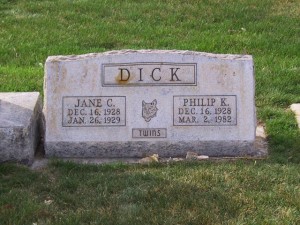 We walked across campus and ran into our philosophy professor and I told him, “Dick is dead.” Which he took a certain way, until we explained ourselves and told him we were headed to Pat’s to commemorate over pizza and beer. He tagged along (nothing like a college in a small town) and we enjoyed a long conversation about art, philosophy, Herman Hesse (who had meant something to the philosophy professor in his youth), women, dogs, European politics, Sumerian magic (one of my obsessions then), and of course women. (Did I mention women? Ah, art school!) But Dick was dead. We screened Bladerunner at our film festival the following year and two months after that I moved West, looking for the ghosts of Jack Kerouac and Neal Cassady, which I soon discovered were being kept in a box with Dick’s ghost, and the box was owned by Rudy Rucker.” — Cal Godot
We walked across campus and ran into our philosophy professor and I told him, “Dick is dead.” Which he took a certain way, until we explained ourselves and told him we were headed to Pat’s to commemorate over pizza and beer. He tagged along (nothing like a college in a small town) and we enjoyed a long conversation about art, philosophy, Herman Hesse (who had meant something to the philosophy professor in his youth), women, dogs, European politics, Sumerian magic (one of my obsessions then), and of course women. (Did I mention women? Ah, art school!) But Dick was dead. We screened Bladerunner at our film festival the following year and two months after that I moved West, looking for the ghosts of Jack Kerouac and Neal Cassady, which I soon discovered were being kept in a box with Dick’s ghost, and the box was owned by Rudy Rucker.” — Cal Godot
“I was a couple weeks short of 30 and had been to a memorial for Bob Marley at UCLA only weeks before. I’d recently checked the OC phone books for Phil’s # or address and was intending to write him care of some contact address I’d found. I don’t think I’d known about his move to Orange County until A SCANNER DARKLY was published in 1977 and hadn’t considered contacting him until 1981 after I’d written Alfred Lindesmith about a matter briefly mentioned in one of his books and gotten an extremely positive response. I lived in the right geographical area to get access to the information necessary to write an article on the subject and knew he might have some useful correspondence or other material. He did and was very helpful even though he was retired. I was working day shift at a factory and doing an excessive amount of historical research on a greatly expanded subject most of my “free” time. I heard the news about Philip K. Dick’s death from a friendly student who worked in the microfilm section of UCI’s library and let me stay past official closing time until he was closing up around midnight. I couldn’t find a reference to it in the newspaper, don’t think it made the news on radio or TV and I wasn’t absolutely certain it was true until I saw Bladerunner and the end of the credits said something like, “In memory of Philip K. Dick, 1928-1982”. I hadn’t made much effort to verify news I didn’t want to be true.
Early 1982 didn’t seem a very modern or promising time to me as far as I can recall; some confluence of forces that should have shaped the future fell apart in the 70s. Ex-Governor Reagan was President now, I was constantly short of sleep, almost 30 and still doing low wage factory work, whine, whine, whine… Then my favorite living author died and I didn’t even like his last book (THE DIVINE INVASION)!
I’d been reading him for about 20 years but the summer of 1964 must have been the first time I read a novel by him. I just looked up the publication date for Game-Players of Titan and it’s listed as December 1963 but I got my copy in early summer from a little stack of SF paperbacks someone left behind in a motel room. I wasn’t very impressed and didn’t read another of his novels until after reading a review of THE MAN IN THE HIGH CASTLE in an SF magazine. I was still pretty limited to reading library books and magazines or buying used books and mags so my reading order didn’t start matching publication order until maybe 1968. I’m geussing it was 1965-7 when I read TMITHC and I became a huge fan then reading all the novels I could find and searching more for magazine issues with stories by PKD. Oh, I don’t remember refering to him or hearing him called PKD until around 1981 though I may have and I didn’t know much about his personal life or literary critical opinions about his work during his lifetime.
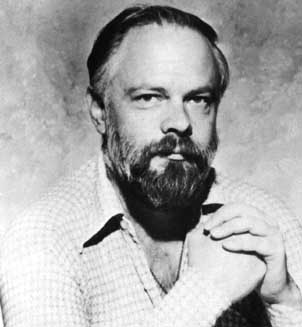 I read all sorts of things written about PKD, his themes, his stories and novels (either in general or about specific ones) and think the bulk of what I read is A) terribly flawed in some manner or B) written from cultural, social, temporal perspectives very different than mine or some combination of A and B. Perhaps the worst aspect of this to me is that so much of it seems basically received opinion that was crafted after his death by W-M Corporations and/or lacks crucial contextual knowledge. I honestly think the discussions I had with friends, had or overheard at parties and other such informal talk in the 60s and 70s was better informed. OTOH, I don’t know what such contemporary conversations are like. This list, which is hardly a general sample of readers, is about the closest I come to informal discussion about PKD or his writings nowadays. And OTTH I’m sure there must be a significant amount of very good discussion & writing that doesn’t seem that way to me because I lack context or perspective to understand it properly. One thing I’m certain of is that I was very fortunate to have read PKD for such a long time when there were new novels and stories to look forward to, so many opportunities to talk with people about the brand new one, there was so much shared contemporary background knowledge for us to speculate about topical references or commentary and there was so little lit. crit. we were aware of or mass media “information/slush/stereotypes” to come between us and what we read. In a very real sense we were freer to think for ourselves, to perceive and interpret what Phil wrote without it passing through an external PKD filter first and in our discussions we mostly had to stand or fall (or float!) without appeal to authority. Maybe this wasn’t so much the case for SF fans who went to conventions and panels and whatnot though they did still wouldn’t have had the mass media sludge bombardment. I’m just writing from my personal experience and perspective in the midst of distractions.
I read all sorts of things written about PKD, his themes, his stories and novels (either in general or about specific ones) and think the bulk of what I read is A) terribly flawed in some manner or B) written from cultural, social, temporal perspectives very different than mine or some combination of A and B. Perhaps the worst aspect of this to me is that so much of it seems basically received opinion that was crafted after his death by W-M Corporations and/or lacks crucial contextual knowledge. I honestly think the discussions I had with friends, had or overheard at parties and other such informal talk in the 60s and 70s was better informed. OTOH, I don’t know what such contemporary conversations are like. This list, which is hardly a general sample of readers, is about the closest I come to informal discussion about PKD or his writings nowadays. And OTTH I’m sure there must be a significant amount of very good discussion & writing that doesn’t seem that way to me because I lack context or perspective to understand it properly. One thing I’m certain of is that I was very fortunate to have read PKD for such a long time when there were new novels and stories to look forward to, so many opportunities to talk with people about the brand new one, there was so much shared contemporary background knowledge for us to speculate about topical references or commentary and there was so little lit. crit. we were aware of or mass media “information/slush/stereotypes” to come between us and what we read. In a very real sense we were freer to think for ourselves, to perceive and interpret what Phil wrote without it passing through an external PKD filter first and in our discussions we mostly had to stand or fall (or float!) without appeal to authority. Maybe this wasn’t so much the case for SF fans who went to conventions and panels and whatnot though they did still wouldn’t have had the mass media sludge bombardment. I’m just writing from my personal experience and perspective in the midst of distractions.
No cell phones, no internet, Soviet Union still apparently going strong, the space program barely visible, PTSD was still PTSS … It seems like we’ve gone through a lot of generations worth of social and technological change since 1982.” — David Keller
“I was still eighteen and about to take up cultural anthropology at Cologne university later in fall (I got my M.A. sixteen years later but that’s another long story). I sure enough wrote my papers on a Olympia Junior portable typewriter (those long nights to get it finally right – type-wise!). I don’t really know how I get to know about Phil’s death (but I did), I think it was a (very) small note in a newspaper, probably the FAZ. I was devastated. My father had died a couple years before (same birth year as Phil). Together with Stan Lem Phil was my late childhood’s guardian and soul mate – and I still had only read those German garbage translations of the seventies. Nevertheless it was that great year when Germany beat Italy in the world soccer finals. Otherwise it was a thoroughly shitty year for the young’un as the long conservative reign in Germany started with Helmut Kohl taking over in October for a very long dark tea-time of the soul. Him and Ronny Reagan, what synchronicity! That Germany also won the European Song Contest that year could not help – the song was too shitty, and trying to get steam by pop-supporting the huge anti-NATO peace movement of the day that had it’s biggest manifestations to date in that year (hundreds of thousands demonstrating in Bonn at the NATO conference). That ABBA broke up was not that bad but I was a huge fan of them when I was like eleven and so it did count. But definitely adding more to the gloom of that year was that Rainer Werner Fassbinder also died. As Phil was my man for novels, he was my man for movies. Good people die, bad people rise to power – that was the feel of 1982 to me. Otherwise it was still 28 years up to the year 2000 and thus loads of time to get that future in place. The C64 was just being rolled out, the emoticon invented, and we had our first baby born via artificial insemination, it was commonly called “Retortenbaby” (retort baby) in Germany as if it was cooked up in an alembic by Dr. Frankenstein.” — Andre Welling
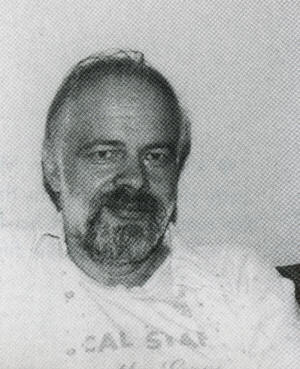 “I also do not have a clear memory of how I found out about Dick being dead, I had first read a book of short stories in the mid-70s and then onto 3-stigmata etc. whatever showed up in the paperback science fiction sections of bookstores. I had soon begun telling everyone I talked books with that pkd was the greatest living novelist. That usually drew blank stares from everyone except a woman who had lived in France. I think I heard about his death by word of mouth, not being quite sure, but I do remember that I was definitely aware that he was dead by the time I saw mention in the credits of Blade Runner when it was released. Some found out even later; a geophysicist at Amoco (now absorbed into BP), who went to a lot of SF conventions during that period and got to know pkd well enough to have his phone number, told me that he tried to call him up with congratulations after seeing Blade Runner (he obviously did not sit through the credits). News was hard to get outside the mainstream.” — W. Stephen Lewis
“I also do not have a clear memory of how I found out about Dick being dead, I had first read a book of short stories in the mid-70s and then onto 3-stigmata etc. whatever showed up in the paperback science fiction sections of bookstores. I had soon begun telling everyone I talked books with that pkd was the greatest living novelist. That usually drew blank stares from everyone except a woman who had lived in France. I think I heard about his death by word of mouth, not being quite sure, but I do remember that I was definitely aware that he was dead by the time I saw mention in the credits of Blade Runner when it was released. Some found out even later; a geophysicist at Amoco (now absorbed into BP), who went to a lot of SF conventions during that period and got to know pkd well enough to have his phone number, told me that he tried to call him up with congratulations after seeing Blade Runner (he obviously did not sit through the credits). News was hard to get outside the mainstream.” — W. Stephen Lewis
“In ’82, I was living in a trailer in the middle of the Ozarks hills contemplating, reading SF magazines and drinking lots of wine. And getting a divorce. Shortly after that, I moved to Springfield, entered the university, started the Communication Disorders program and continued reading Phil. About a year later I was helping a friend clear out some old newspapers and came upon his obituary in the New York Times. At that point I went on a frantic search for the books I didn’t have and started learning about the man who had entered my brain and never left.” — Laura Entwisle
“I was on the Mexican border, working on the Bisbee Poetry Festival, studying magic. I had heard about the movie in the works. But I couldn’t juggle. But north of us was a tiny outpost of the Native American Church with a new paper bag of peyote. Well, what’s a guy to do. I remember at this point that Penultimate Truth was my fave. maybe because I had read it as a kid in the backseat of my parents’ car while they were drunk & screaming at each other, so it was close, like I could start reading it out loud any sec. Scanner made me itch. I loved Martian Time Slip and Man in the High Castle too. I still don’t like bugs under the skin. Mi gente were all reading Gurdjief. I was reading Robert Anton Wilson. When he died, we tripped. But mi gente thought science fiction was stupid and didn’t know him. I was in the closet. PKD was in there with me. I kept thinking about being in Berzerkley and a science fiction bookstore there had promised PKD would show to sign his new Crap Artist book. he didn’t show. Where was he? Had I missed my chance? I recall there were giant centipedes and some area artists put them in lucite to make bracelets. I never came down.” — Chris Dietz
“I was 3 years old when PKD died. But I used to see him driving around Sonoma…” — Ted Hand
“I heard David G. Hartwell discuss the event at a convention some time ago. He said that he mobilized his office to get the word out to the media that a great talent had passed. So those news stories were probably a direct result.
I was an sf and sf “media” fan at the time, and knew of Dick through the SF Encyclopedia, from reading Dangerous Visions (“Faith of our Fathers”) and maybe another story or two. I was looking forward to Blade Runner. But as I remember it, I learned the news from Time. I didn’t become a PKD fan until a year later.
There’s a fair amount of hyperbole that enters the conversation whenever Dick’s sf vs. mainstream career comes up. Yes, sf was still a big ghetto at the beginning of Dick’s career. But sf steadily became more respectable while he was alive, and he was one of the Big Name Science Fiction Authors of his era.” — Frank Hollander
Links To Other Remembrances:
Philip K. Dick discussed on To the best of our KNOWLEDGE
mp3
Philip K. Dick (1928-1982) (in French)
Philip K Dick – Reflections on the 30th Anniversary of his Death
(Original Link: Philip K Dick – Reflections on the 30th Anniversary of his Death, Blogcritics, March 2, 2012)
Philip K. Dick: 30 years gone, and a PKD festival!
(Original Link: Philip K. Dick: 30 years gone, and a PKD festival!, Boing Boing, March 2, 2012)
Really, Very nice job, Michael!! I hope the fans appreciate the wonders you continue to do with this site. Honestly, it’s the best it’s ever been, IMHO. (and you Dickheads should push the Paypal button. I have!!) A PKD site is a terrible thing to lose!! (remember??) I linked in my blog: http://blog.aksbook.com/2012/03/thirty-years-ago-today.html yay!!!
In 1982 I hadn’t yet rediscovered PKD’s novels (that happened in 1984 with EYE IN THE SKY) and did not know he had died until this later date. I was sad to find this out but what can you do? In 1982 I was married, just had a baby, and was fighting with the UAW against General Motors in a factory in Kokomo, Indiana. It wasn’t until I’d read more of his stories that I realised what a loss PKD’s passing was to all of us fans. But, thanks to Paul Williams and Andy Watson and their cohorts at The Philip K. Dick Society Newsletter that I took comfort in the fact that PKD, although dead, was not forgotten. For me, Philip K. Dick lives!
Aw, this was an incredibly nice post. Taking the time and actual effort to make a superb article
I was about 11 or 12 in 1977 when I first discovered PKD. I was reading a lot of Ray Bradbury and Isaac Asimov at the time when I came across an intriguing new book in the science fiction section of my local library. It pictured a semi-human robot missing part of its arm, standing in a field of sheep. The title, of course, was “Do Androids Dream of Electric Sheep?” After reading it I was an instant fan and began to search out as many of his novels as possible in the two or three libraries near my home and requested copies as birthday and Christmas presents. He became, together with Bradbury, one of my childhood heroes. I even had visions of meeting Dick one day. But then one Saturday in 1982 I wandered into the newsagents in town to pick up a copy of OMNI magazine and was devastated to read of his death. His works formed the “soundtrack” to my childhood and have had a profound influence on me. Even though I don’t read his works as regularly they still provide comfort in troubled times.
‘Faith of our fathers’.
Re the book and the film, may I plug here my longform blogpost, “What did Philip K Dick think of Blade Runner?” (https://soothfairy.com/2022/09/16/what-did-philip-k-dick-think-of-blade-runner) I conclude he (finally) loved what he saw of it shortly before his untimely death.